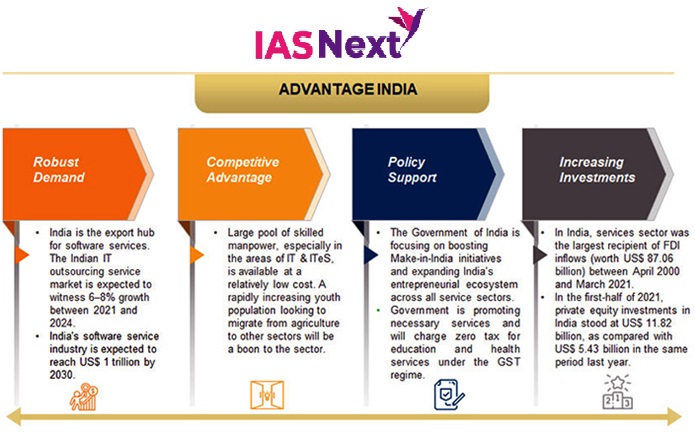CURRENT AFFAIRS
Get the most updated and recent current affair content on Padhaikaro.com
Boosting Services Export in India
- IAS NEXT, Lucknow
- 11, Nov 2021

Reference News:
Recently, the Ministry of Commerce and Industry announced that it is working on a plan to reach a services export target of USD 1 trillion by 2030. This target is nearly five times of what India exported last fiscal (FY 2020).
Key Points
- Services Sector in India:
- Data Analysis: India is the world’s seventh-largest services exporter.
- Share of the services sector accounted for 54% of the total Gross Value Added (GVA) in FY21.
- The services sector is a key driver of India’s economic growth, providing employment to nearly 26 million and contributing about 40% to India’s total global exports.
- The services sector has also been the largest recipient of foreign direct investment, making up for 53% of the total inflows between 2000 and 2021.
- Spread: India’s services sector covers a wide variety of activities such as trade, hotel and restaurants, transport, storage and communication, financing, insurance, real estate, business services, community, social and personal services, and services associated with construction.
- Data Analysis: India is the world’s seventh-largest services exporter.
Significance:
- Surplus in services trade has long narrowed the often-huge deficit in India’s merchandise shipments.
- With renewed focus and targeted government intervention, services trade surplus could rise further from as much as $89 billion in FY21 and almost wipe out the deficit caused by merchandise exports.
- This sector is boosting India’s transition from an ‘assembly economy’ to a ‘knowledge-based economy’.
- Skill India programme envisages to provide adequate training in market-relevant skills to over 40 crore youth by 2022.
- Purchasing Managers Index (PMI) is an indicator of business activity in the manufacturing and services sectors.
- Plan to Boost Services Exports:
- Diversifying Services Sector: There is a need to boost opportunities in high-growth segments beyond the dominant information technology and IT-enabled services (ITeS). For example:
- The opening up of the domestic legal services sector will benefit Indian lawyers as they would get huge opportunities in countries such as Europe, Australia and America.
- Further, the need is to focus on promising areas like higher education, hospitality and medical tourism.
- FTAs in Services: To support the services sector, the government has been actively pursuing market access opportunities via Free-Trade Agreements (FTAs) with key economies (including the UK, the EU, Australia and the UAE).
- Fine Tuning SEIS Scheme: The government is working on a programme that could replace the Service Exports from India Scheme (SEIS) in its current form.
- According to the government, the services industry needs to shun the crutches of government subsidies.
- This will encourage firms to raise competitiveness.
- Also, the subsidy amount can be utilised for those who need it more.
- Diversifying Services Sector: There is a need to boost opportunities in high-growth segments beyond the dominant information technology and IT-enabled services (ITeS). For example:

Service Exports from India Scheme
- It was introduced in April 2015 for 5 Years under the Foreign Trade Policy of India 2015-2020.
- Earlier, this Scheme was named as Served from India Scheme (SFIS Scheme) for Financial Year 2009-2014.
- Under the scheme, the government gives 3-5% incentive on net foreign exchange earned in the form of duty-credit scrips. Scrips can be used for payment of basic and additional Customs duties on goods imported.
Way Forward
- Production-linked Incentive Like Scheme in Services: The government should consider something for the services sector, in line with the production-linked incentive scheme.
- Becoming Part of Global Value Chains: India should be striving to embed itself in global value chains.
- If India wants to become a major exporter, it should specialize more in the areas of its comparative advantage and achieve significant quantity expansion.
- B2B Model: Developing a dynamic Business 2 Business (B2B) portal, which can be used by service providers to reach out to the markets abroad.
- Foreign Trade Policy (FTP): Unless the government focuses on the sector in the forthcoming Foreign Trade Policy (FTP) by announcing scheme-based export incentives and provides interim relief by continuing with the existing schemes in the short run, the sector will lose the momentum it has gained in the first five months of 2021-22.